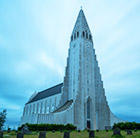Iceland Destination Guide
Iceland is a little island country located wayyy up north near the Artic Circle. Situated in the Atlantic Ocean close to Greenland, funnily enough the two islands could easily exchange names since it's Iceland that actually remains green for most of the year.
With a thousand years of mixed Gaelic and Norse influences, the country's relative isolation has made Icelanders community-oriented and you'll witness many unique and long-standing cultural traditions when you visit.
These traditions include the continuous use of Icelandic – one of the oldest languages in the world - which remains mostly unchanged as recorded in the cherished Viking sagas dating back to the Middle Ages.
See how Iceland got its name
Home to about 320,000 people, most Icelanders live in and around the capital Reykjavik. A cosmopolitan and friendly city, Reykjavik is known for the colourful roofs of its houses and more notably for being the most northern capital city in the world.
Outside the capital you'll find a sparsely populated countryside that's rich in beautiful landscapes of flowing lava fields, rugged mountains, highlands and glaciers.
Due to the country's location near the Arctic Circle, many travellers are compelled to undertake Iceland holidays during the Northern hemisphere winter season. From November to February is when snow often blankets the ground and the famous Northern Lights appear in the sky.
The awe-inspiring display, known by its scientific name as Aurora Borealis, most often appears in green hues and on rare occasions pink and blue.
Other fascinating activities include volcano treks, elf spotting (elves are taken very seriously in Iceland and are no laughing matter), whale watching and many forms of adventure sports including skiing, sea kayaking and - scuba diving?! Yes, brave the cold because Silfra is a world-renowned dive spot!
Melt in a thermal spa
If all this talk of 'ice' and 'north' is making you shiver then rest assured because Mother Nature has blessed Iceland with the famous Blue Lagoon. Iceland's iconic geothermal spa, Blue Lagoon's water temperature remains a constant 40 degrees Celsius all year round.
With countless pools and saunas, swimming is a very popular pastime right throughout Iceland. The country even lays claim to a geothermal beach, Nautholsvik. A well-kept local secret, Nautholsvik is where you can swim in cold sea that's fused with hot geothermal water.
An Iceland tour isn't complete without also visiting one of country's many waterfalls. Glymur is the highest, Gullfoss is the easiest to reach from the capital, but Seljalandsfoss is the most majestic.
Flights to Iceland depart regularly from major European transport hubs such as London and Frankfurt, as well as from neighbouring Nordic countries Norway and Sweden, giving you the perfect opportunity to break up your travel with an attractive stopover.









